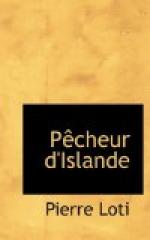It has become a trite saying that French genius lacks the sense of Nature, that the French tongue is colourless, and therefore wants the most striking feature of poetry. If we abandoned for one moment the domain of letters and took a comprehensive view of the field of art, we might be permitted to express astonishment at the passing of so summary a judgment on the genius of a nation which has, in the real sense of the term, produced two such painters of Nature as Claude Lorrain and Corot. But even in the realm of letters it is easily seen that this mode of thinking is due largely to insufficient knowledge of the language’s resources, and to a study of French literature which does not extend beyond the seventeenth century. Without going back to the Duke of Orleans and to Villon, one need only read a few of the poets of the sixteenth century to be struck by the prominence given to Nature in their writings. Nothing is more delightful than Ronsard’s word-paintings of his sweet country of Vendome. Until the day of Malherbe, the didactic Regnier and the Calvinistic Marot are the only two who could be said to give colour to the preconceived and prevalent notion as to the dryness of French poetry. And even after Malherbe, in the seventeenth century, we find that La Fontaine, the most truly French of French writers, was a passionate lover of Nature. He who can see nothing in the latter’s fables beyond the little dramas which they unfold and the ordinary moral which the poet draws therefrom, must confess that he fails to understand him. His landscapes possess precision, accuracy, and life, while such is the fragrance of his speech that it seems laden with the fresh perfume of the fields and furrows.
Racine himself, the most penetrating and the most psychological of poets, is too well versed in the human soul not to have felt its intimate union with Nature. His magnificent verse in Phedre,
“Ah, que ne suis-je assise a l’ombre des forets!”
is but the cry of despair, the appeal, filled with anguish, of a heart that is troubled and which oft has sought peace and alleviation amid the cold indifference of inanimate things. The small place given to Nature in the French literature of the seventeenth century is not to be ascribed to the language nor explained by a lack of sensibility on the part of the race. The true cause is to be found in the spirit of that period; for investigation will disclose that the very same condition then characterized the literatures of England, of Spain, and of Italy.
We must bear in mind that, owing to an almost unique combination of circumstances, there never has been a period when man was more convinced of the nobility and, I dare say it, of the sovereignty of man, or was more inclined to look upon the latter as a being independent of the external world. He did not suspect the intimately close bonds which unite the creature to the medium in which it lives. A man of the world




